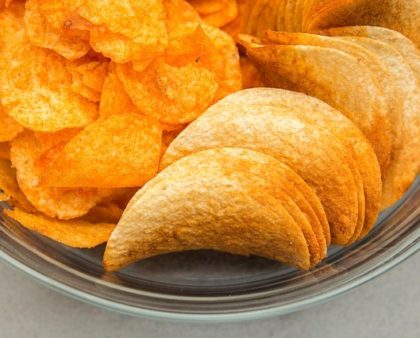Increase in Negative Behaviors after Consuming Pringles?

Pringles are a snack that are very attractive to children based on the fun packaging and the shape of the chips. Pringles were first developed by Proctor and Gamble (P&G). The idea was to create a perfectly shaped chip that wasn’t greasy and could be stored for prolonged periods without going stale.
This snack was first sold in 1967 and is now sold in more than 140 countries. P&G sold the brand to Kellogg in 2012.
Pringles are actually not real potato chips, but are a blend of wheat starch and flours mixed in with a whole list of other ingredients. It’s those other ingredients that make this particular snack a bad choice for children on the autistic spectrum.
Pringles Artificial Ingredients
These ingredients include sweeteners, such as maltodextrin and dextrose. Pringles also contain a long list of flavor enhancers, such as MSG, disodium inosinate, disodium guanylate, sodium caseinate and modified foods starch. MSG (MonoSodium Glutamate) has been shown to cause mood and behavior changes, including hyperactivity and headaches.
To top it all off, this snack also has a lot of artificial food colorings. You may find additional artificial ingredients depending on the particular flavor of this snack.
Negative Behaviors
Many parents know how a child’s behavior can change based on the consumption of particular foods. That is the main reason many parents with children on the spectrum follow a gluten and casein-free diet. Other parents may avoid food colorings and certain artificial flavors.
Based on our own experience with Pringles, we have seen an increase in the negative behaviors in our child (on the spectrum) after consuming these “chips”.
While Pringles may be a good snack for most people, for children on the spectrum it can be considered a chemistry experiment gone horribly wrong. Therefore, parents should be aware that the ingredients in this snack food could increase negative behaviors in children with autism.
If you have had similar experiences with this snack food, please leave a comment.
More Reading
Pringles are not potato crisps: https://news.bbc.co.uk/2/hi/business/7490346.stm
Adrienne Samuels, Ph.D.(2013) It wasn’t Alzheimer’s – It was MSG.
Ingredients that contain hidden MSG
Image courtesy of Thomas Didgeman.
